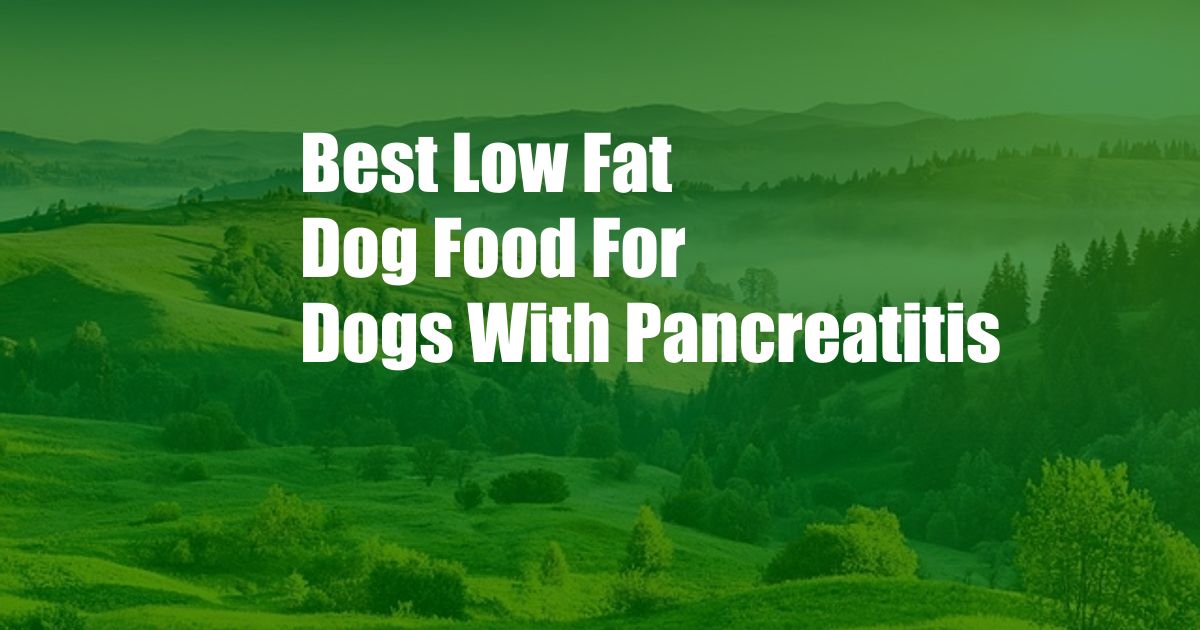
Best Low-Fat Dog Food for Dogs with Pancreatitis: A Comprehensive Guide
My beloved golden retriever, Max, was diagnosed with pancreatitis a few years ago. I was devastated and determined to do everything I could to help him. One of the most important steps was finding the right diet. After extensive research, I discovered that low-fat dog food is essential for dogs with pancreatitis.
In this article, I’ll share everything I’ve learned about low-fat dog food for dogs with pancreatitis. I’ll provide a comprehensive overview of the condition, discuss the latest trends and developments, and offer expert advice on choosing the best food for your furry friend.
Understanding Pancreatitis in Dogs
Pancreatitis is an inflammation of the pancreas, a vital organ responsible for producing digestive enzymes and regulating blood sugar levels. When the pancreas becomes inflamed, it can cause a range of symptoms, including:
- Abdominal pain
- Vomiting
- Diarrhea
- Lethargy
- Loss of appetite
The exact cause of pancreatitis in dogs is often unknown, but certain factors can increase the risk, such as:
- Obesity
- Certain medications
- Genetics
- Certain breeds (e.g., miniature schnauzers, poodles)
The Importance of Low-Fat Dog Food for Dogs with Pancreatitis
A low-fat diet is crucial for dogs with pancreatitis because fat can trigger further inflammation. When fat is digested, it releases fatty acids into the bloodstream, which can stimulate the pancreas to produce more enzymes. This can worsen the inflammation and lead to more severe symptoms.
Therefore, it’s essential to choose a dog food that contains less than 10% fat. This will help reduce the risk of pancreatitis flare-ups and improve your dog’s overall health.
Choosing the Best Low-Fat Dog Food
When selecting a low-fat dog food for your dog with pancreatitis, there are several factors to consider:
- Protein content: Look for a food that has a moderate protein content (18-25%). Too much protein can put strain on the pancreas.
- Carbohydrate content: Choose a food that has a high carbohydrate content (50-60%). Carbohydrates provide energy and can help reduce the risk of hypoglycemia (low blood sugar).
- Fiber content: Fiber can help regulate digestion and slow down the absorption of glucose into the bloodstream.
- Ingredients: Avoid foods that contain high-fat ingredients, such as meat byproducts, poultry fat, or vegetable oils.
It’s also important to consult with your veterinarian before changing your dog’s diet. They can help you choose a food that is right for your dog’s individual needs.
Tips and Expert Advice
- Feed small meals frequently: This can help reduce the risk of pancreatitis flare-ups by preventing the pancreas from overproducing enzymes.
- Avoid high-fat treats: These can trigger inflammation and worsen symptoms.
- Monitor your dog closely: Pay attention to any changes in your dog’s behavior or symptoms. If you notice anything unusual, contact your veterinarian immediately.
FAQs
- Q: What are some good low-fat dog food options for dogs with pancreatitis?
- A: Some recommended brands include Royal Canin Gastrointestinal Low Fat, Hill’s Prescription Diet i/d Low Fat, and Purina Pro Plan Veterinary Diets EN Gastroenteric.
- Q: Can I make low-fat dog food at home?
- A: It is possible, but it can be difficult to ensure that the food is balanced and meets all of your dog’s nutritional needs.
- Q: How long should I feed my dog a low-fat diet?
- A: The length of time will depend on the severity of your dog’s pancreatitis. Some dogs may need to be on a low-fat diet for the rest of their lives.
Conclusion
Choosing the right low-fat dog food for your dog with pancreatitis is crucial for managing the condition and improving your dog’s health. By following the tips and advice in this article, you can help your furry friend live a long and happy life.
Are you interested in learning more about low-fat dog food for dogs with pancreatitis? Let me know in the comments below!